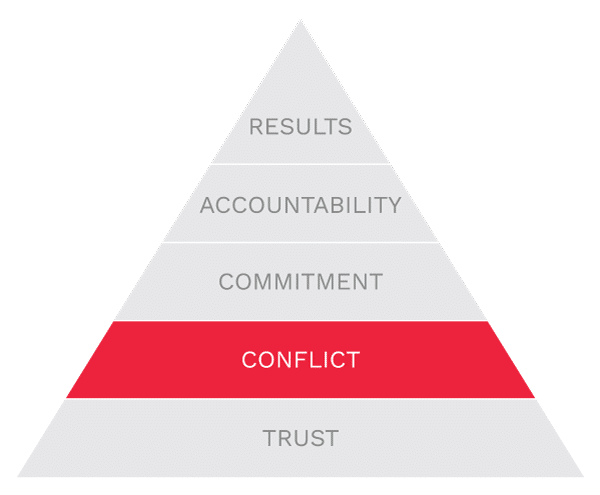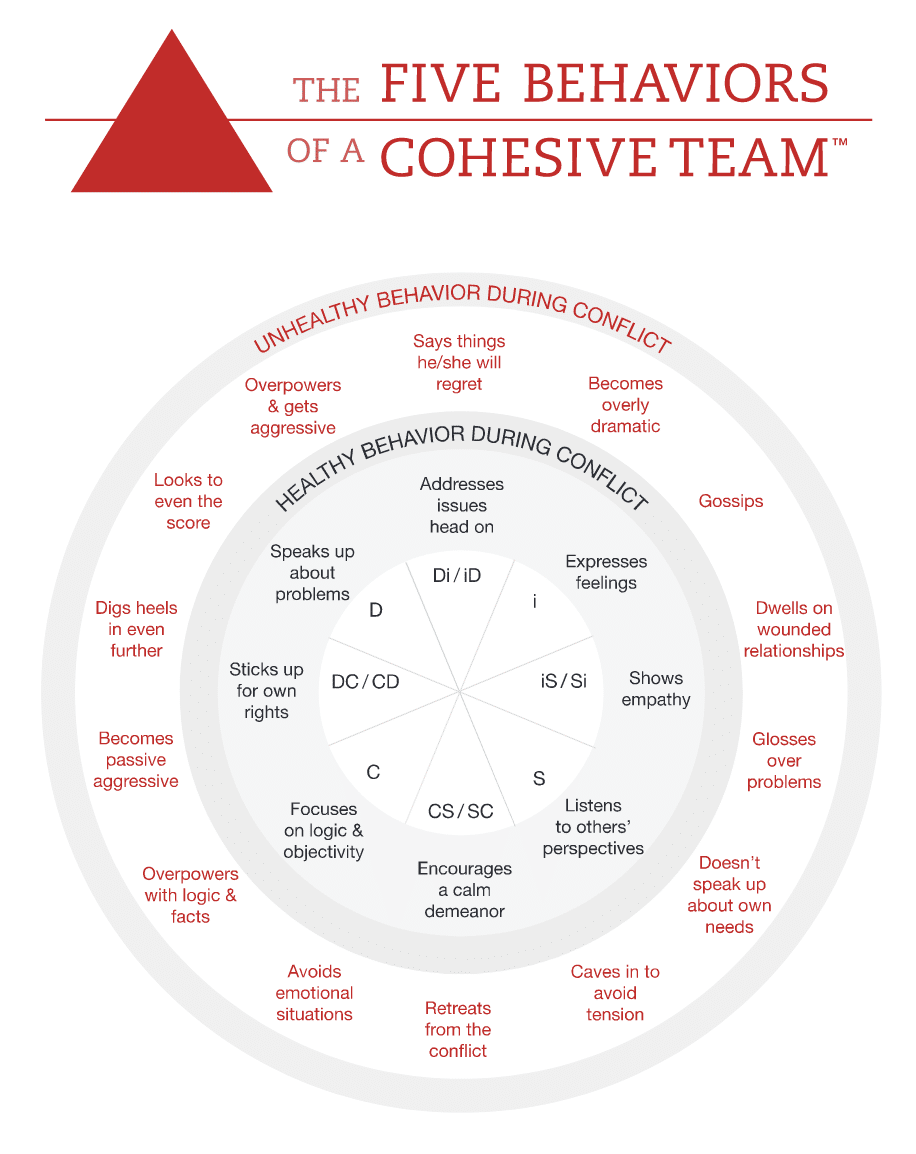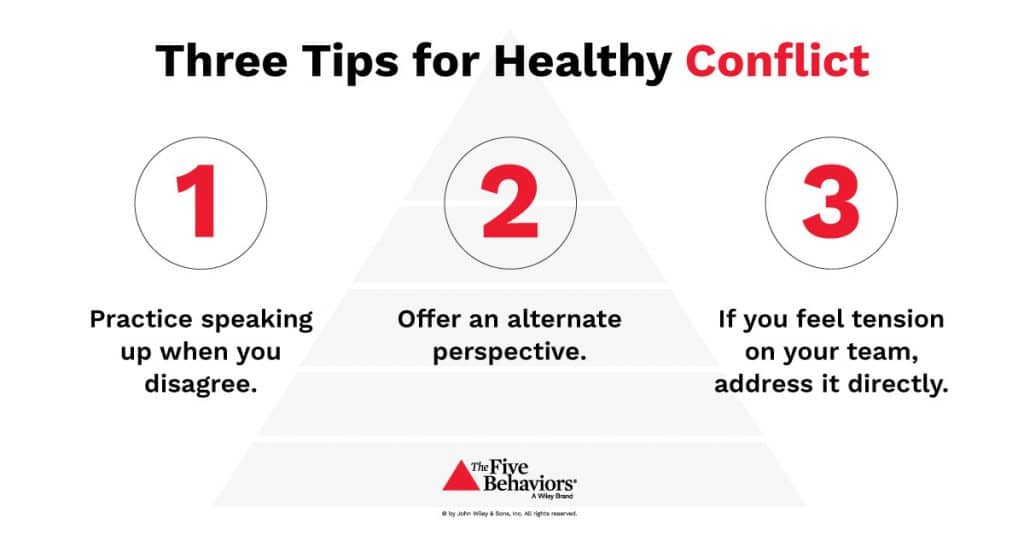Seventy-six percent of employees are part of at least two teams within their organization, according to a 2020 survey (PDF). With so many shifting and short-term teams, traditional team building may not always be possible. That’s why individuals must develop teamwork skills they can carry with them as they move between working groups.
Today we’re looking at conflict skills. This is the second article in our series on developing individual behaviors that can make you a better teammate across teams. (See the article on trust.)
Engaging in constructive debate—something that was already difficult—is ten times harder when done over videoconferencing. Online education expert Joshua Kim writes, “An in-person meeting with smart colleagues where we disagree and hash out the issues leaves me energized. The same discussion over Zoom makes me want to take a nap.” Especially now, with the rise in remote work, we must become intentional about growing our skills around conflict.
Being a good teammate doesn’t always mean “playing nice”
In a 2019 survey, Wiley asked 12,000 people, “What’s the first word that comes to mind when you think of conflict?” and 90 percent of the responses were negative.
The first time people encounter the Five Behaviors® model of cohesive teams, they can be surprised that conflict is one of the characteristics of healthy teams. Many of us learn how to minimize conflict, rather than how to encourage and navigate it in a way that makes it productive. According to The Five Behaviors Personal Development profile, “Conflict is often considered taboo, especially at work, and people may spend inordinate amounts of time and energy trying to avoid the kind of passionate debates that are essential to any great team.”
Team effectiveness advisor Liane Davey has this to say to “nice people”: “If you think you’re ‘taking one for the team’ by not rocking the boat, you’re deluding yourself. Teams need conflict to function effectively.”
The way we each engage with conflict differs based on our personality types and our personal histories, from childhood on. It’s also important to note that conflict is tied up with cultural factors, gendered behavior expectations, and other social conventions.
Let’s start by getting more specific about the type of conflict that builds strong teams.
What do we mean by conflict?
You may be thinking, “Oh, we have plenty of conflict on our team already.” But we’re not talking about infighting and politics. We’re talking about productive conflict—debate that is focused on concepts and ideas and avoids mean-spirited personal attacks.
How regularly do you exercise these skills of productive conflict?
- Voice your opinions, even if it may cause disagreement.
- Seek out teammates’ opinions, especially if they differ from yours.
- Bring up and deal with difficult issues, instead of talking around them.
- Explore everyone’s ideas, knowing that the exploration will uncover the best solution.
When individuals on a team are skilled at conflict, the team is freed to engage in passionate, unguarded discussions (and meetings are a lot less boring).
In another article, we discussed why trust—specifically, vulnerability-based trust—is the foundation of teamwork. Conflict absolutely relies on trust. With trust, says The Five Behaviors Personal Development, “team members feel safe engaging in passionate and sometimes emotional debate, knowing that they will not be punished or resented for saying something that might otherwise be interpreted as destructive or critical.”
Avoiding conflict takes a great deal of energy—energy that would be better used tackling difficult topics and finding creative solutions. Teams that trust each other can say what’s on their minds and focus on ideological debate without being as worried about hurt feelings. With trust, team members start from a place of assuming positive intent rather than entering a debate with their walls already up.
Why is conflict so hard to do well?
When things get heated, natural personality differences are often amplified. For example, while you may appreciate a teammate’s attention to detail on a regular day, that same quality may appear to you during debate as them being overly critical or shooting down everyone’s ideas.
People struggle with conflict for different reasons, based on their personalities and backgrounds. Do any of these resonate with you?
- You approach conflict as a win/lose situation or power struggle.
- You are put off when people make emotional arguments.
- You are put off when people focus only on facts when clearly feelings are also relevant.
- You just want to move forward, and debate feels like over-discussing.
- You are soft-spoken and struggle to be heard.
- You are uncomfortable when people argue, so you withdraw.
- You prefer to research and prepare your arguments ahead of time, making spontaneous debate stressful.
- You are worried that conflict will damage your relationships.
- Your listening skills go out the window when conflict heats up.
- You’re in the habit of playing “devil’s advocate,” which can smother your teammates’ enthusiasm.
Just as each person struggles with conflict in different ways, each person has natural strengths they can bring to conflict situations. Maybe you excel at speaking your mind. Maybe you enjoy encouraging others to share their ideas. Maybe your even-tempered nature helps create a sense of calm during debate, or your objective nature helps you sort out facts from emotions to keep the team focused. To improve your skills around productive conflict, you can build on your existing strengths while developing the skills that don’t come as naturally to you.
How can I get better at conflict?
The Five Behaviors Personal Development tells us that “the first step to engaging in productive conflict is acknowledging that conflict can be a good and necessary thing that will ultimately benefit the team.” That mindset can shift you out of pure conflict-avoidance mode. If you go through your day with the conscious or unconscious goal of minimizing conflict at every turn, you’re missing opportunities to have lively discussions and solve real problems.
Understand what aspects of conflict are hard for you and for others
Your personal Conflict Skills Tune-up Plan starts with understanding your current tendencies around conflict. The Five Behaviors Personal Development assessment and profile were created to give you a personalized road map for being a better teammate. The report shows where you fall on the spectrum between spirited debater versus calm debater and receptive versus steadfast. It illuminates your strengths and struggles and recommends an action plan for developing good conflict habits.
Personal Development covers the five foundations of teamwork. For a deeper dive into your relationship with conflict, take a look at Everything DiSC Productive Conflict. This 23-page profile explains how your values show up during conflict, what drains your energy, and how those things differ for people of other DiSC® styles. You’ll learn to identify destructive responses and reframe your thoughts for better outcomes.
Tips for making conflict more productive
A personal assessment is important because the advice differs based on existing strengths. One person’s goal may be “speak up more,” while their colleague’s goal is “speak less, listen more.” But here is some general advice on getting more skillful at conflict.
- Get to know your teammates better outside of conflict situations so that when conflict arises, you understand where they’re coming from.
- Keep the focus on ideas; don’t get personal. (You can set feelings aside without setting relationships aside.)
- Contribute your honest opinions, even if it means disagreeing with someone you admire.
- Allow debate to play out, rather than trying to smooth over healthy disagreements.
- Don’t cave in to more forceful teammates. Just because someone is self-assured doesn’t mean their idea is more valuable than yours.
- Redefine what “winning an argument” means. Winning is finding the best solution, even if it wasn’t your idea.
- Seek out all teammates’ opinions. Recognize when people are pulling away and encourage them to participate.
- Be willing to raise tough issues and challenge flaws in others’ arguments.
- Show that you are willing to listen with an open mind.
- After a healthy debate, remind teammates that conflict is productive and commend the team for engaging in it.
Choose one or two of these behaviors you’d like to get better at. Practice them, starting in lower-stakes debates. And remember, you cannot control how others respond to conflict, but your response to conflict situations is in your own control.
Individual skills for team success
A team is more than the sum of its individuals, so ideally teams can explore trust and conflict together. But with so many people working across several teams, on short-lived project teams, or as independent contractors, this may not happen. Whether or not you’re on a team that engages in team-building work, you can still take the initiative to hone your own team skills, a process that starts with self-discovery. As with any skill, the key to improvement is consistent practice.





